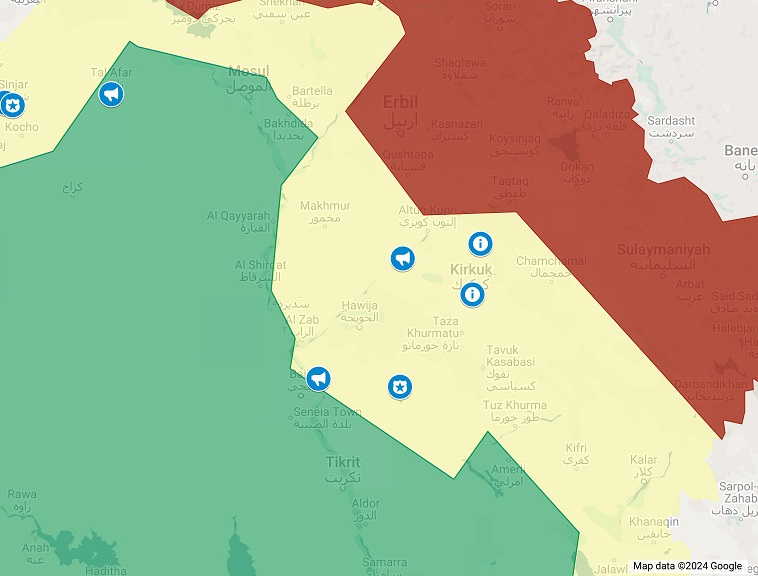1.1K
A biweekly brief of events and news occurred in the disputed territories.
Kirkuk
- After months of local elections, Kirkuk’s political landscape remains deeply divided, hindering the formation of an administration. Iraqi Prime Minister Mohammed Shia al Sudani met with leaders from the winning parties on February 21 in an attempt to broker agreements. A statement from al Sudani’s office outlined points of agreement, including the establishment of a “Kirkuk administration coalition” and a commitment to “partnership, consensus, and non-exclusion” as guiding principles for governance in Kirkuk. Despite several subsequent meetings led by Prime Minister al Sudani with the winning parties, they were unsuccessful in reaching a consensus on forming the administration. The primary dispute centers around the allocation of the governorship post, with the Kurds, Arabs, and Turkmen each seeking the position. The suggestion to divide the governorship term into alternating periods has met resistance from the Kurdish faction, who hold seven out of sixteen seats and constitute the majority in the province.”
- On February 25, the Iraqi Supreme Court ruled to compel the Independent High Electoral Commission (IHEC) to audit and review the voters’ registration in Kirkuk province. The lawsuit was initiated by the head of the Turkmen Front, Hassan Turan, and is perceived as targeting Kurdish voters who returned to Kirkuk after displacement by the former Iraqi regime. Separately, the Supreme Court dismissed a lawsuit filed by Iranian-backed politicians contesting their loss in the election. The lawsuit sought the annulment of the results of the recent provincial council election in Kirkuk.
- On March 15, four Turkmen and a Shabiki lawmaker announced the establishment of a new parliamentary bloc within the House of Representatives, splitting from the Turkish-backed Turkmen Front-led coalition. In a video statement, two prominent lawmakers, Garib Askar and Mokhtar al Mosawi, cited their decision as a move to “enhance Turkmen political efficacy” and serve the “national interest.” They named the new coalition “Turkmen Framework Bloc.” The bloc is primarily composed of Iranian-backed lawmakers.
- The State Organization for Marketing of Oil (SOMO) released general statistics on exports and revenue for February without disclosing details. According to SOMO, 99,592,311 barrels were exported, primarily through Basrah. However, the report omitted Kirkuk exports to Jordan, as exports to Turkey have remained suspended since March 2023. This report marks the first instance since 2003 that details of oil exports have been withheld. In a separate development, on March 10, the Oil Pipelines company, a division of the Oil Ministry, announced the completion of repairs and renovations to the Beji-Kirkuk pipeline. This comes after the pipeline was disrupted in 2014 due to terrorist attacks. The pipeline facilitates the transportation of oil products such as gasoline, kerosene, and natural gas from the Beji refineries to Kirkuk warehouses, boasting a daily export capacity of 4 to 6 million liters. Spanning 86 kilometers, the pipeline serves as a vital link between the Beji refinery and Kirkuk.
- On February 29, security forces arrested a Da’esh terrorist responsible for financing operations in Kirkuk. Additionally, on March 2, warplanes targeted a Da’esh hideout in the Wadi Shay (Rokhana valley) near the Daquq district. With the terrorist group intensifying its activities, federal government officials, including a committee from the Interior Ministry and the Army Chief of Staff, visited Kirkuk on separate occasions. Despite numerous official visits from Baghdad, efforts to transfer the security file to the local police, as previously agreed upon during the formation of the Iraqi cabinet, have been unsuccessful. Since 2017, when Iraqi forces, including Iranian-backed militias, assumed security responsibilities in the province after displacing the Peshmerga forces, Da’esh terrorists have notably escalated attacks in Kirkuk.
Shingal (Sinjar)
- On February 29, a Turkish drone targeted a vehicle belonging to the Sinjar Resistance Units (YBS) near Rasga village in the Yazidi district of Shingal. This attack resulted in the death of a YBS commander and injuries to another member. Similarly, on March 8, a Turkish drone strike killed one YBS member and wounded two others near Qasraka, west of Shingal. In another development, a Yazidi girl named Govan Edo was liberated from the al Hol camp in Syria. Edo returned to her home after spending a decade in Da’esh captivity. She was abducted alongside thousands of girls during the genocide perpetrated by the terrorists in 2014.

